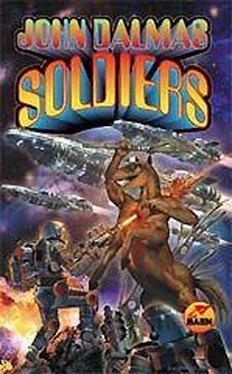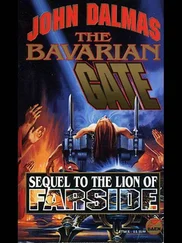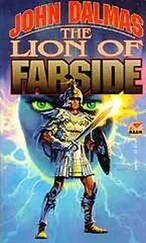John Dalmas - Soldiers
Здесь есть возможность читать онлайн «John Dalmas - Soldiers» весь текст электронной книги совершенно бесплатно (целиком полную версию без сокращений). В некоторых случаях можно слушать аудио, скачать через торрент в формате fb2 и присутствует краткое содержание. Жанр: Космическая фантастика, на английском языке. Описание произведения, (предисловие) а так же отзывы посетителей доступны на портале библиотеки ЛибКат.
- Название:Soldiers
- Автор:
- Жанр:
- Год:неизвестен
- ISBN:нет данных
- Рейтинг книги:3 / 5. Голосов: 1
-
Избранное:Добавить в избранное
- Отзывы:
-
Ваша оценка:
- 60
- 1
- 2
- 3
- 4
- 5
Soldiers: краткое содержание, описание и аннотация
Предлагаем к чтению аннотацию, описание, краткое содержание или предисловие (зависит от того, что написал сам автор книги «Soldiers»). Если вы не нашли необходимую информацию о книге — напишите в комментариях, мы постараемся отыскать её.
Soldiers — читать онлайн бесплатно полную книгу (весь текст) целиком
Ниже представлен текст книги, разбитый по страницам. Система сохранения места последней прочитанной страницы, позволяет с удобством читать онлайн бесплатно книгу «Soldiers», без необходимости каждый раз заново искать на чём Вы остановились. Поставьте закладку, и сможете в любой момент перейти на страницу, на которой закончили чтение.
Интервал:
Закладка:
The summer after his thirteenth birthday, by the New Jerusalem calendar, a youth took a farm. Unless, of course, he was in line to inherit one. With family help, he might buy one in his own neighborhood-complete with buildings and mortgage-if one was for sale. But more often he moved to the frontier, and claimed new, wild land at the edge of settlement. Land surveyed by the Church, which valued orderly ways. There, with the help of neighbors, he built a log house, a log barn, and sheds, and began life as an adult. He might bring a wife from his old community, or marry into the new, and over the years they'd produce a brood of their own, to repeat the cycle.
His first winter on his homestead, he'd hire himself out to an established neighbor, clearing land. And on his own holding, clear a garden patch, and "deaden" timber. The ax-girdled trees died a year later, and their roots and stumps didn't sprout. No one on New Jerusalem could explain why, physiologically, or felt any need to; it was simply a fact of life. Afterward, "grass" grew beneath the dead trees, providing pasture for livestock and attracting wild herbivores-wild meat. Certain food plants could even be grown in the much reduced shade. And by the time the deadened trees had been felled, cut up, dragged and burned, the roots were much decayed. The settler then had a field, hard won but ready to plow.
Thus the typical Jerusalemites were strong, tough, self-reliant. And subject to the authority of their physical environment and the hierarchy, both of which they accepted matter-of-factly. They were a matter-of-fact people.
Meanwhile they were unfamiliar with ethnic or religious diversity. Their immigrant ancestors had been fervent sectarians, "full of the spirit." On Terra, they'd been fearful and indignant toward a society abounding with subcultures, where political, social and religious varieties sometimes yammered, and occasionally squabbled. Despite which there was already widespread mixing, intermarrying, blending.
From the beginning, the goal of the founders had been emigration. It had taken courage, dedication, zeal, and pretty much all their earthly wealth to organize and incorporate a colonization company, lease emigrant ships, meet the requirements for the Commonwealth's approval to launch, and leave behind almost everything familiar except each other. Many families were divided, and some, when it came down to it, backed out.
Of those who'd followed through, the most common trait had been zeal.
Those born to New Jerusalem were different from their migrant ancestors, though they didn't know it. They'd been inculcated from infancy with, and only with, the dogmas, values and customs of those ancestors. As modified by the early experiences of life in a heavyworld wilderness. A world where the severe difficulties of heavyworld pregnancy, and gravity-induced, early deterioration of joints and organs, culled the early generations ruthlessly, shortening lives, and helping menfolk value their wives and daughters.
Whatever religious zeal they felt was seldom fervent. Like Esau Wesley and his wife Jael, they took their religion for granted. Its strictures seldom seemed onerous to them, and most were reasonably content with their lives.
Lives to be lived doing worthwhile things deemed pleasing to the Lord, finding satisfactions in farming, and in their offspring and each other. Given the effects of gravity on human physiology and anatomy, the Church had recently condoned the use, after five births, of a contraceptive herb known as lamb bane. This after three generations of earnest but confidential consideration and discussion at the highest hierarchical level.
The founders would have been horrified. But even given the generations of culling by New Jerusalem's gravity, deaths in childbirth left too many husbands alone on the farm with a brood of children to care for. And available widows were far fewer than widowers.
Esau Wesley rarely thought about such things. He was young, sure of himself, and found pleasure in work. After wiping sweat, he'd picked up his ax to assault another tree, when his hound Clancy began to bark. Esau knew from the tone that the dog sensed a human coming, not a predator. Someone the dog knew.
"Halloo!" the young man called. Then "Clancy! Shut up!" From a little distance came an answering halloo. A minute later, a man on horseback rode into sight among the trees: Speaker Martin Crosby from Sycamore Run,* one of Jael's uncles.
"What brings you, Speaker?" Esau asked. Crosby hadn't been there since the parish had raised Esau's house and barn the summer before, though he'd seen him at church often enough. The older man looked more serious than usual. Outside of church, he was inclined to joke and laugh a lot.
"Got news," he said. "Big news." From his face, it was bad.
"Such as?"
"Such as-a war."
"A war?" Esau was mystified rather than alarmed. War on New Jerusalem was impossible.
"Word just came from Terra."
"Terra? What's that got to do with us?"
The older farmer sighed gustily and shook his head. "Elder Fletcher is sending word to all the people." He paused, as if what followed was so unreal, he lacked the words. "Satan is coming through the worlds, with his demons. They've got the body of a donkey, with a sort of man stuck on where the neck ought to be, and a head like nothing you'd ever imagine."
"You sure someone hasn't been japing you, Speaker Crosby?"
The man reached into a saddlebag, brought out a folder, and leaning down, handed Esau a piece of durable paper. A photocopy from the Commonwealth embassy, printed on both sides, with a picture. It had begun as a mental image, crossing the parsecs to Terra instantaneously, from a savant on a world called Maritimus. It was almost the last thing the water world's savant saw before blacking out, a strange phenomenon even for savants. From Terra the image had been forwarded to the embassy, and sketched by the savant there. Speaker Crosby knew none of that, of course. It was enough that Elder Fletcher accepted it.
"Keep it," Crosby said. "I've got more than enough. The demons know how to find people hiding, and got ways of killing them from the sky. That's what's said, anyway. There's sixteen thousand ships full of them, giant arks for flying between the stars. They've come to various worlds that's got folks living on them, worlds way far off, and killed everyone there, man, woman, and child. Butchered them, and wrecked everything."
Esau looked at the picture, then back at Crosby, still not convinced, but troubled. Speaker Crosby took out another folder, this time with sheets of writing in quill pen and ink, copied at the embassy by some Terran artifice.
"This one's written by Elder Fletcher, in his own hand, telling us what we might do. Not have to, but might. When you go up for supper, read them with Jael. See what you think. I got a bunch more of these to take around."
The older man turned his horse then-what passed for a horse on New Jerusalem-and trotted off. Esau stood where he was, and read what Elder Fletcher had written. When he was done, he felt a deep misgiving. Without ringing another tree, Esau Wesley picked up his ax and started home. It seemed to him his whole world was about to come down around his ears.
Chapter 11
The Task
Joao Gordeenko was not at his best. As deputy czar of resource allocation, he'd worked till 0320 that morning, then slept on his office couch till 0730. Which had left time for only a hasty shower and shave, a cup of strong coffee, and to get dressed before receiving his first visitor. Breakfast would wait, probably till lunch.
The visitor, a new staff assistant, was very pretty, very bright, and very sure of herself. And well recommended. He hoped that Sarah Asayama would prove as able as her recommender claimed, but he was skeptical. She spoke well, but she'd never had anything approaching the responsibility of her new position. There was a lot of that in the burgeoning war bureaucracy. It was unavoidable. There were too few people with the knowledge and experience needed. Some would learn successfully on the job, coping, innovating. Others would be replaced, sent elsewhere.
Читать дальшеИнтервал:
Закладка:
Похожие книги на «Soldiers»
Представляем Вашему вниманию похожие книги на «Soldiers» списком для выбора. Мы отобрали схожую по названию и смыслу литературу в надежде предоставить читателям больше вариантов отыскать новые, интересные, ещё непрочитанные произведения.
Обсуждение, отзывы о книге «Soldiers» и просто собственные мнения читателей. Оставьте ваши комментарии, напишите, что Вы думаете о произведении, его смысле или главных героях. Укажите что конкретно понравилось, а что нет, и почему Вы так считаете.








